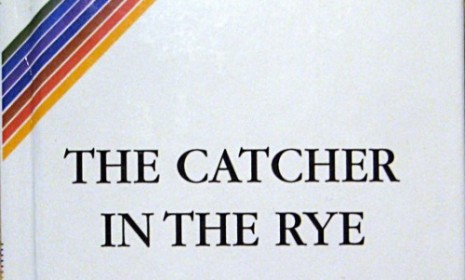The 'Catcher in the Rye' sequel you'll never read
After a long legal battle, J.D. Salinger's estate and the author of an unauthorized "Catcher" sequel have agreed that it won't be published in North America

When J.D. Salinger died early last year, the reclusive author was embroiled in an ongoing court fight against a man who had published an unauthorized sequel to A Catcher in the Rye. Last week, the legal wrangling came to a close when Salinger's estate reached a settlement with the new book's author. Here, a brief guide to the Rye sequel Americans will never get to read:
What is this sequel?
The book is called 60 Years Later: Coming Through the Rye and it follows an older Holden Caulfield on a journey that is similar to the one the character takes as an adolescent in Salinger's novel. The sequel ends with the 76-year-old Caulfield standing at a carousel in Central Park. In 2009, a judge involved in the case called it a "rather dismal piece of work."
The Week
Escape your echo chamber. Get the facts behind the news, plus analysis from multiple perspectives.

Sign up for The Week's Free Newsletters
From our morning news briefing to a weekly Good News Newsletter, get the best of The Week delivered directly to your inbox.
From our morning news briefing to a weekly Good News Newsletter, get the best of The Week delivered directly to your inbox.
Who is the author?
Fredrick Colting, an American who lives in Sweden under the pseudonym "J.D. California." He has previously published such tomes as The Pornstar Name Book: The Dirtiest Names On The Planet and The Macho Man's Drinkbook: Because Nude Girls And Alcohol Go Great Together.
How did this case get to court?
Colting first published his book in the United Kingdom in 2009, when Salinger was still alive. Salinger's lawyers took action, calling the book "a rip-off, pure and simple." In July 2009, a U.S. District Court judge permanently banned the publication of the book, saying it went beyond fair use and did not "transform" the original enough to count as parody. Later that month, Colting appealed the decision, calling his book "a highly transformative work of commentary and criticism." The appeals process continued through 2010.
A free daily email with the biggest news stories of the day – and the best features from TheWeek.com
How was the dispute resolved?
The Salinger estate reached a deal with Colting. He will not be allowed to sell the book in the United States and Canada or dedicate it to Salinger, and he must change its name. But the tome is now for sale in England. "It seems as though Salinger's lawyers have loosened their collars since the reclusive curmudgeon passed away this past winter," says Matt Kiebus at Death + Taxes. "And that's not a good thing."
Are there other "unofficial" books like this out there?
Yes, the "best known example" is Jean Rhys's 1966 prequel to Charlotte Brontë's Jane Eyre, called Wide Sargasso Sea. "Sometimes an author's creation, be it a character or a concept, so far transcends its origins that it almost becomes fair game," says David Barnett in The Guardian. "Maybe America should give a septuagenarian Holden Caulfield a chance."
Sources: Time, Wall Street Journal (2), BBC News, Telegraph, Death + Taxes, Guardian
-
 The battle over the Irish language in Northern Ireland
The battle over the Irish language in Northern IrelandUnder the Radar Popularity is soaring across Northern Ireland, but dual-language sign policies agitate division as unionists accuse nationalists of cultural erosion
-
 Villa Treville Positano: a glamorous sanctuary on the Amalfi Coast
Villa Treville Positano: a glamorous sanctuary on the Amalfi CoastThe Week Recommends Franco Zeffirelli’s former private estate is now one of Italy’s most exclusive hotels
-
 How roadkill is a surprising boon to scientific research
How roadkill is a surprising boon to scientific researchUnder the radar We can learn from animals without trapping and capturing them